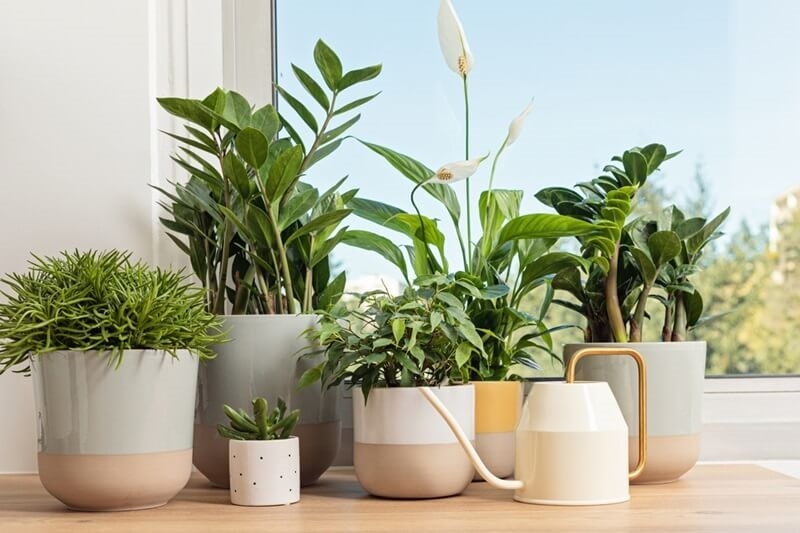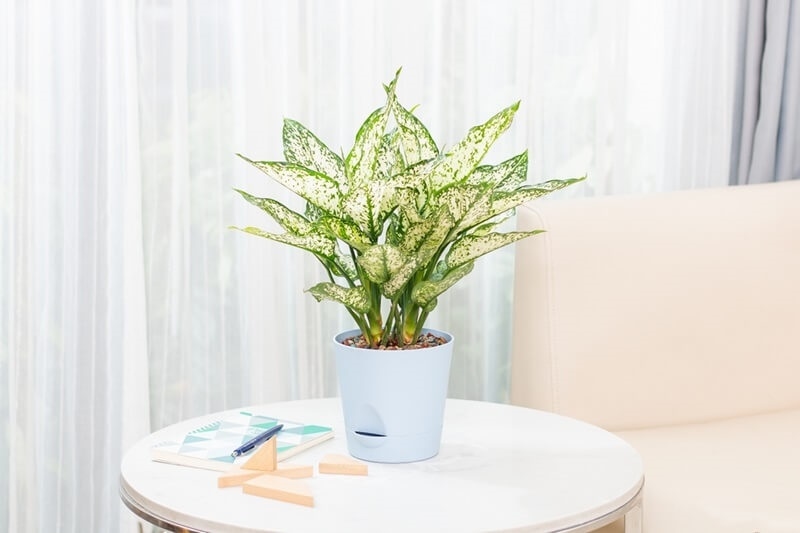Houseplants That Thrive Indoors With Simple Natural Care

Houseplants are now a staple of modern living spaces—they create a nature-inspired moment in our homes and improve indoor air quality. For new plant enthusiasts, low-maintenance and straightforward indoor plants are ideal, offering a fun and enjoyable gardening experience. Discovering the natural care of houseplants will allow your plants to flourish in your home without the need for chemicals or a cumbersome set of instructions. Whether you have a large house or a small apartment, you will find these low-maintenance apartment plants easy and enjoyable to use for decorating your home and adding cheer with minimal time and fuss.
In this article, we will cover practical strategies for watering your houseplants, plant considerations for maintaining healthy houseplants, and easy-to-care-for plant choices for beginners that will thrive in indoor environments.
Why Houseplants Are More Than Just Décor
Having houseplants in our homes provides benefits beyond their aesthetic appeal—they promote a healthier, more peaceful living environment. Houseplants act as natural air purifiers by absorbing toxins, creating humidity, and reducing stress. Research indicates that individuals are more relaxed, productive, and creative when surrounded by plants. In addition to their health benefits, houseplants are also a great way to add a personal touch to your home!! They have incredible shapes, textures, and colors that can turn any room into a peaceful retreat.
Best Easy Indoor Plants for Beginners

If you're starting your indoor gardening journey, one of the best plant choices is resilient, tolerant, and adaptable plants. Below are some of the best easy indoor plants for beginners; all of them require minimal attention to thrive:
- Snake Plant (Sansevieria): A neurotrophic plant that can tolerate low light and sporadic watering and is practically indestructible.
- Pothos (Epipremnum aureum): An excellent option for hanging baskets or a shelf, pothos will grow fast and thrive across a variety of lighting conditions.
- Spider Plant (Chlorophytum comosum): Grown as a houseplant over the years, first-time plant parents do well with it because of its tolerance to heat & humidity. They will even provide indoor air quality!
- ZZ Plant (Zamioculcas zamiifolia): A perennial favorite in indoor plants, it's a low-maintenance apartment plant that survives weeks without getting watered!
- Peace Lily (Spathiphyllum): The Peace Lily has gorgeous, glossy green leaves and beautiful blooms that have air-purifying qualities while adding elegance to any indoor space.
While these plants may have specific care needs, they are adaptable enough to be a good fit for homes or offices where care routines may vary.
How to Care for Houseplants Naturally
Knowing how to care for houseplants naturally means your indoor garden can remain in a healthy, chemical-free state. Natural care is beneficial for both you and your plants, creating a healthier and safer space for you, your family, and your pets.
Tips to care for plants naturally:
- Use organic fertilizer: Compost tea is an organic option that provides nutrient-dense solutions for your soil, and worm castings and diluted fish emulsion are healthy organic alternatives for soil nutrients as well.
- Gently clean the leaves: Dust can build up on leaves and impede access to sunlight. Use a damp cloth to wipe down the leaves so no dust impairs the plants' ability to breathe.
- Encourage natural pest control: Neem oil, mild soap sprays, or beneficial insects like ladybugs are great ways to eliminate and control pests naturally.
- Provide access to proper sun exposure: Indoors, it is essential to establish a spot for your plants to grow in indirect sunlight to prevent burning the leaves while establishing their growth.
- Rotate the plants regularly: in doing so, the plants will be exposed to enough sunlight while growing both evenly and symmetrically.
By practicing healthy, natural plant care, you not only allow for the optimal growth of your houseplants but also help support a more environmentally friendly home.
The Ultimate Houseplant Watering Guide
Houseplants often suffer from improper watering. Following a simple houseplant watering guide could easily transform your houseplant from wilted to thriving.
Tips to remember to get it right:
- Check soil moisture: Stick your finger into the soil about an inch deep. If it is dry, you should water it.
- Water well: You want the water to reach the roots of the plant, not just moisten the top of the soil. After watering, empty any saucers that have filled to avoid root rot.
- Consider the plant type: Succulents and cacti prefer dry soil. Tropical plants, such as ferns and calatheas, prefer soil that is moist or moderately moist.
- Consider the season: Plants generally need less water during the winter, as they are growing more slowly or not at all.
- Use room temperature water: Do not shock their roots with cold water; this could even cause a health issue like rot. On the other hand, warm water may encourage bacterial growth.
The important part is developing a routine to provide consistent watering, so your plants can settle in and grow even better in your home setting.
Low-Maintenance Apartment Plants for Busy Lifestyles
If you’re a city dweller with a busy schedule, low-maintenance apartment plants are your best companions. These plants are designed by nature to withstand neglect and irregular care.
Top choices for low-maintenance living:
- Aloe Vera: Beyond its healing gel, aloe is a hardy succulent that needs little water and lots of light.
- Chinese Evergreen (Aglaonema): Tolerant of low light and infrequent watering, it’s an excellent plant for dim apartments.
- Jade Plant (Crassula ovata): Its thick leaves store water, making it a perfect option for forgetful plant owners.
- Philodendron: Grows beautifully in indirect light and requires minimal care—just occasional pruning to keep it tidy.
- Lucky Bamboo: Can grow in water or soil, symbolizing good fortune and requiring almost no attention.
These low-maintenance apartment plants are ideal for individuals who desire greenery without the commitment of constant upkeep.
Healthy Houseplant Tips for Long-Term Growth
Maintaining the health of houseplants over time requires consistency and attention to their individual needs. Here are some healthy houseplant tips to help your indoor garden stay lush and thriving:
- Repot when necessary: If roots are circling the pot or growing out of drainage holes, it’s time to move to a larger container.
- Provide proper drainage: Always choose pots with holes to prevent overwatering and root decay.
- Trim dead leaves: Removing yellow or damaged leaves encourages new growth and prevents disease spread.
- Maintain humidity: Some plants love moisture; place a humidifier nearby or mist the leaves occasionally.
- Feed during growing season: Most plants benefit from monthly feeding during spring and summer.
By following these healthy houseplant tips, you’ll notice stronger leaves, vibrant colors, and better overall growth.
Common Mistakes to Avoid in Houseplant Care
Even veteran houseplant keepers can still make some of the simpler errors that lead to plants not growing correctly. Avoiding the following errors can keep your plants happy.
- Overwatering or underwatering, due to your erratic schedule.
- Placing plants in dark corners or bright direct light without considering the plant's light preference.
- Utilizing non-draining pots, which can lead to root rot.
- Not checking for pests until it is too late and they have spread to your other plants.
- Forgetting to wipe dust off leaves or clean the potting area.
Correcting these errors will help you refine your approach to watering your houseplants and develop a more effective care plan.
Benefits of Growing Houseplants at Home
Beyond their aesthetic appeal, houseplants offer numerous benefits that improve your overall well-being:
- Air purification: Removes toxins like formaldehyde and benzene.
- Mood enhancement: Greenery reduces anxiety and promotes relaxation.
- Noise reduction: Dense foliage can absorb sound in smaller rooms.
- Productivity boost: Plants create a calming work environment.
- Natural décor: Adds warmth and life to minimalistic or modern spaces.
When cared for properly, houseplants can enhance both your physical and emotional health, turning your living space into a peaceful retreat.
Conclusion
Houseplants bring nature, beauty, and balance into everyday life, no matter the size of your home. By following a simple houseplant watering guide, selecting low-maintenance apartment plants, and learning how to care for houseplants naturally, you can cultivate a thriving indoor garden that remains healthy throughout the year.
This content was created by AI

